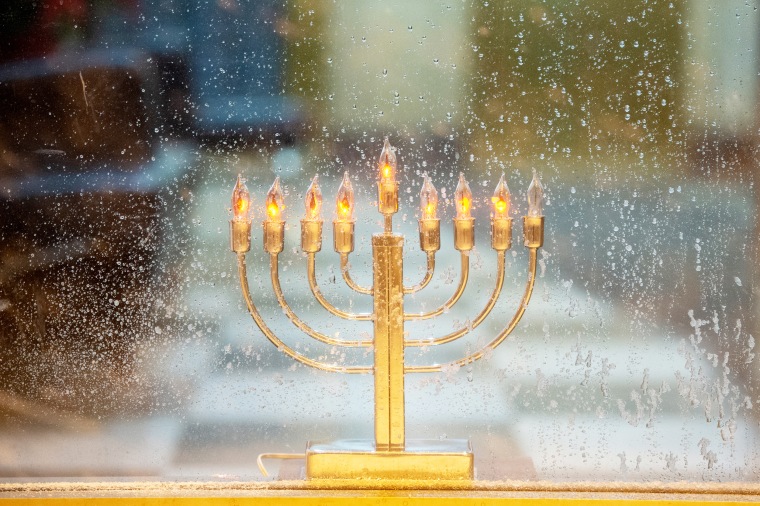Recently my friend sent me a link to an inappropriate pillow on the Bed Bath & Beyond website. No, it wasn’t sexual, but it was wrong. Available for sale is a pillow with a menorah, the phrase “Happy Hanukkah” as well as the phrase “Why is this night different from all other nights?”
If you don’t know, “Why is this night different from all other nights” is part of a prayer traditionally said during a Passover Seder — a spring holiday that has nothing to do with Hanukkah. The only thing the holidays share is that they’re both celebrations of a time when the Jewish people weren’t annihilated, but, unfortunately, most Jewish holidays celebrate that fact. Bed Bath & Beyond did not immediately respond to a request for comment. The pillow has since been taken down from the website, but the conversation that needs to be had cannot just disappear.
Incorrect symbols and phrases occur often on Jewish items for sale.
Would a Christian buy a pillow with “He has risen” emblazoned over a Christmas tree? Using a well-known phrase from one holiday and plopping it onto a symbol of a completely different holiday doesn’t make a festive decoration, or at least one I’m willing to spend my money on.
This pillow is what Bed Bath & Beyond offered its Jewish customers — or, more likely, to customers who don’t know what to gift their Jewish colleagues, neighbors or friends. Who exactly is the target customer for this pillow? Not Jews. Why would we display something nonsensical in our home?
Of course, this is just one example. Earlier this month, until someone called the company out on it, Party City was selling a Hanukkah photo booth set offering cute props like menorahs and dreidels to hold up while posing for a Hanukkah card or an Instagram post. Unfortunately, it also included a sign that said “Lotsa matzah.” Yep, Jews have a holiday during which we eat matzah. That holiday, again, is Passover, not Hanukkah. With the religions flipped, it’s akin to posing with a palm leaf (a symbol from the Christian holiday Palm Sunday) in a Christmas picture.
Asking even one Jewish person for their feedback or spending two minutes on Google could have changed everything.
While one might argue the tea towel set, also from Party City, that said “Deck the halls with matzo balls” (yes, you guessed it, matzo balls are also eaten during Passover) adorned with dreidels on the bottom is relatively harmless, that is not always the case. The photo booth set also included a large black hat with payot — or long, curly, side pieces of hair attached — which is how the ultra-religious dress. By donning this prop, the wearer is costuming themselves as an Orthodox Jew. Could an Orthodox Jewish family want to buy the props? Sure. But there is also the possibility of someone who isn’t of the faith using the set to ostensibly laugh at the community. The package has been removed from Party City’s website, and in a Twitter response, the company admitted to “miss[ing] the mark” with the item; however, it remains for sale by a different store on Amazon.
Incorrect symbols and phrases occur often on Jewish items for sale. In fact, four years ago, I wrote about a cake for Yom Kippur (a fasting holiday) for sale at Whole Foods where the baker applied every Jewish symbol they knew to create a cultural cacophony of icing.
This isn’t cultural appropriation or offensive, but the pillow, photo booth prop, towel and more are just wrong. Is it a silly thing to be mad about? Of course. But it’s not meaningless. The mere gesture of selling a Hanukkah item isn’t enough. It doesn’t feel like inclusivity; it feels like tokenism and exploitation.
These items demonstrate that companies know there is a market they’ve failed to capitalize on. Although it’s not nearly the behemoth Christmas is, there are millions up for grabs for those who can cater to an ever-growing market for Hanukkah decorations. Yet, not all companies can be bothered to ensure their items make sense. These lazy products demonstrate that no one cared to get things right — merely making them available for purchase. Asking even one Jewish person for their feedback or spending two minutes on Google could have changed everything.
There are plenty of large corporations that sell cute Hanukkah items. For example, the shirts my sons and nephews have worn over the years are from Carter’s. There are also hundreds of smaller creators on Etsy who care about getting things right for their customers. And personally, if I’m gifting my friends and family something, I want to know my money is going to a company that cares about what it’s selling, not just that it’s selling something.
